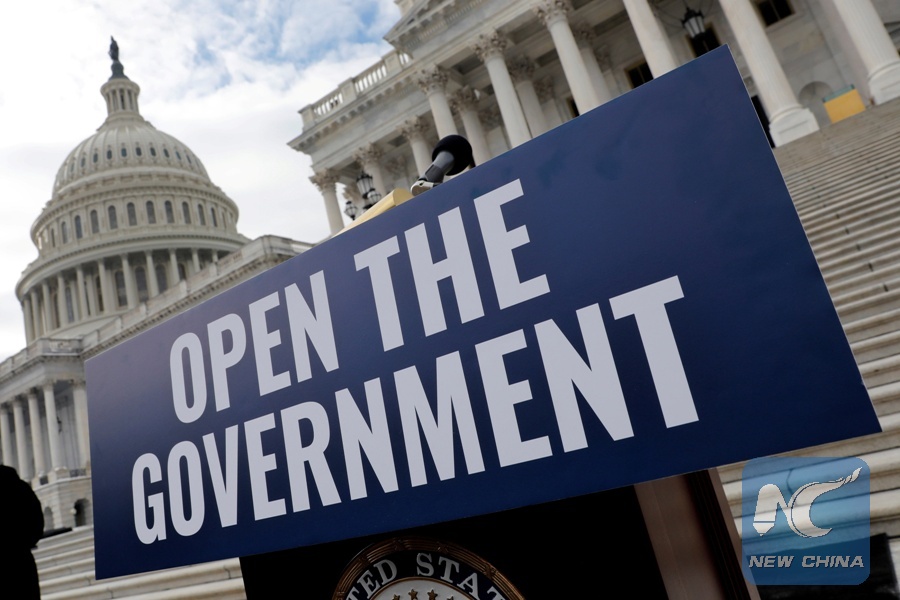
A placard is placed before Senate Democrats' news conference about government shutdown on the steps of the U.S. Capitol in Washington, U.S., Jan. 16, 2019. (Xinhua/REUTERS)
WASHINGTON, Jan. 16 (Xinhua) -- As the partial government shutdown stretches into its 26th day Wednesday, the damage to the overall U.S. economy is piling up, with federal workers, business people, travelers and beyond badly affected.
The record-long U.S. government shutdown would subtract 0.1 percentage point from economic growth every week, twice as originally forecasted, the CNBC on Tuesday quoted a Donald Trump administration official as saying.
"ZERO GROWTH"
Besides the impact on the 800,000 federal workers not receiving their paychecks, the latest White House estimation also factored in the greater losses from private contractors who lost their work, and the suspension of other government spending and functions.
Economists said individuals who are missing their paychecks, including government workers and contractors, would have to cut back on purchases, which would lower consumer spending.
According to a survey conducted by the Wall Street Journal earlier this month, 73 economists expected the economic output to grow by 2.2 percent in the first quarter, which is "down slightly" from prior forecast before the shutdown, and will "likely slip further" if the shutdown continues.
On a more pessimistic note, J.P. Morgan Chase CEO Jamie Dimon said Tuesday that if the shutdown goes on for the whole quarter, it could reduce growth to zero.
The U.S. Chamber of Commerce, the largest lobbying group in the nation, said last week that the shutdown is "harming the American people, the business community, and the economy."
In a letter addressed to members of the U.S. Congress, Neil Bradley, executive vice president of the group, listed the "adverse consequences" of the shutdown: Small businesses are unable to receive assistance from the Small Business Administration; The process of initial public offerings is delayed; The review of mergers and acquisitions is suspended; Companies are unable to receive the approvals required by law to sell their products, and so on.
WHO ARE VICTIMS
Aviation is among the sectors severely hit by the partial shutdown. Delta Air Lines' CEO Ed Bastian said Tuesday that the shutdown will cost the company about 25 million U.S. dollars in revenue this month as fewer government contractors and employees are traveling.
For the American public, the impact on air travel is also visible. Air traffic controllers and Transportation Security Administration (TSA) agents are among the "essential" federal workers who are working without pay. As more workers call in sick, some airports have been forced to temporarily close or cut back flights at some terminals, including Atlanta's Hartsfield-Jackson International Airport and the Washington Dulles International Airport.
The shutdown is also hitting the tourism industry nationwide, as historic sites, national parks and federal museums have been closed due to a lapse in funding. In some cities, restaurant and food truck sales dropped, and hotel occupancy rate went down.
"Our local restaurants have reported a 20 percent average decrease in sales with some losing as much as 60 percent in sales," Kathy Hollinger, president and CEO of the Restaurant Association of Metropolitan Washington, said in a statement Wednesday.
For Wall Street investors, a lack of economic data could make their job difficult. The lengthy government shutdown has held up the release of key data, such as retail sales, housing starts, budget deficit, international trade, and could even delay the economic growth rate in the fourth quarter, to be released later this month.
NO CLOSER TO SETTLEMENT
Since the closing of a quarter of the federal government on Dec. 22, the White House and the Democratic congressional leaders have held several rounds of negotiations over border security and wall funding, the sticking point in the shutdown, but appeared to get no closer to solving the budget impasse.
David Leblang, a professor of politics at the University of Virginia, told Xinhua Tuesday that he doesn't think one side will fold in the coming days. "What is more likely is that a bipartisan group of Senators get together and craft a compromise bill that helps and hurts both sides."
A bipartisan group of Senators plans to send a letter to President Donald Trump and urge him to support a stopgap bill in order to reopen the government, the Hill reported Wednesday. The letter, which is still in circulation among Senators, would take up the president's border wall request as a supplemental appropriations bill.
A prolonged government shutdown could have a negative impact on the U.S. economy, Federal Reserve Chairman Jerome Powell said last week. "If we have an extended shutdown, I do think that would show up in the data pretty clear."

